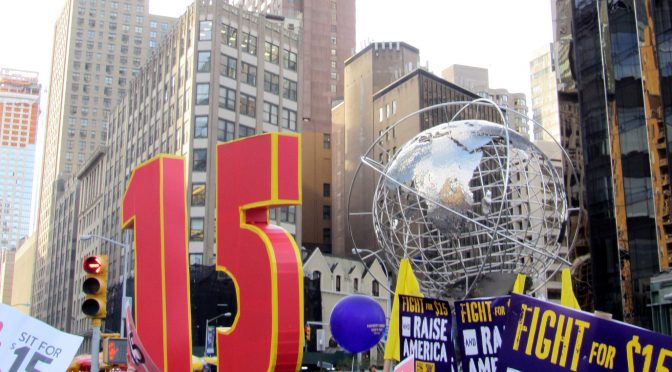In a recent In These Times article (When Raising the Minimum Wage is a Bad Thing), Murphy Prof. Stephanie Luce and Jen Kern warn of the perils of conceding ground on minimum wage in the name of short term gains:
First, we cannot accept short-term gains in the form of a higher wage if they mean concessions that undermine our ability to organize over the long haul. Such concessions could include the ability to form unions, engage in collective bargaining, strike and protest. For example, a minimum wage increase that comes alongside cuts to the Department of Labor’s inspection staff would be a major setback. A minimum wage increase that comes at the price of “right-to-work” provisions would be disastrous.
The minimum wage is a valuable tool for raising the incomes of millions of workers, but it loses much of its value if worker organizations and movements are too weak to enforce the law. It doesn’t help people without jobs and only minimally helps those with few hours of work. Most importantly, minimum wages have the greatest impact when workers have unions to protect their jobs and help them move up to higher paid positions.
Second, we must be wary of attempts to divide our movement. The first minimum wage, which was passed in 1938, excluded domestic workers and farmworkers—occupations that were dominated by African-American workers. Today, the federal law sets a much lower minimum wage for tipped workers—a practice that disproportionately hurts women and people of color. An increase to the minimum wage must benefit everyone, including farmworkers and people who work for tips.
It’s also quite possible that a higher minimum wage could be linked to concessions on policies that impact unemployed workers, through cuts to unemployment benefits and the safety net. If we accept an increase to the minimum wage on these terms, we will drive a further wedge between the so-called “deserving” and “non-deserving” poor. Indeed, our ability to win depends on whether this fight is an inclusive one.
They remind us:
Our job isn’t to find common ground with Trump or to figure out ways to work with a hostile administration that will put forward terrible deals. Our job is to build organizations and make our movements more powerful.
For more on the role of unions, trade and infrastructure under Trump, read the full article at In These Times.



